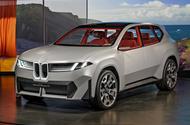The new-look kidney grille takes direct inspiration from the 1960s Neue Klasse cars
iX3 successor gets a calmer look and classic grille to go with new platform, drivetrain and tech ‘superbrain’
The new Vision Neue Klasse X concept showcases the future design of BMW’s bespoke electric SUVs – and closely previews the next-generation successor to the iX3, due to launch next year.
It’s a companion piece to the Vision Neue Klasse saloon concept that was revealed last year and exhibits the differing design language that will be applied to BMW’s bespoke electric saloons and SUVs in the near future.
BMW CEO Oliver Zipse said that the two concepts showcase “the breadth of our future model line-up”.
Appearing broadly similar in size to the current iX3, the new concept will be readied for production next year as the first of the next-generation Neue Klasse EVs.
Like the i3 saloon that will result from the Vision Neue Klasse, the SUV will be based on BMW’s new EV-specific architecture, featuring an advanced new software stack running on four high-performance computers.
The most notable styling feature of the Neue Klasse X is the new-look kidney grille, comprising of two tall, thin elements, taking inspiration from the original 1960s Neue Klasse saloons and coupés. The grille design is marked out by LEDs, creating a light signature and giving it a three-dimensional appearance.
A variation of the design will be used on all Neue Klasse SUVs, while Neue Klasse saloons will take their cues from the flatter, wider grille of last year’s concept.
Elsewhere, the Neue Klasse X appears to take clearer cues from BMW’s existing SUVs, particularly the flagship iX.
The exterior appears closer to production-ready than the Neue Klasse saloon. It retains a number of design trends from that concept, including the removal of all the exterior cladding elements and badges. The SUV even features the BMW roundel laser-etched into the bonnet, although that element is unlikely to be carried over to the production car.
The rear of the concept features a new interpretation of BMW’s L-shaped tail-lights, while the C-pillar retains the classic Hofmeister kink – albeit marked out by what’s called a reflective print surface.
In place of the cladding traditionally used on the side skirts and front and rear aprons, BMW has substituted parts made from recycled mono-materials, which will be more cost-effective to replace if damaged and can then be recycled for future reuse.
The interior of the Vision Neue Klasse X seems to be more conceptual, although the general dashboard and infotainment interface will be retained for production.
There’s a large central touchscreen, and this is mirrored by a new system called BMW Panoramic Vision, which projects key information across the full width of the windscreen and so can be seen by everyone in the car. That’s accompanied by a new three-dimensional head-up display and a steering wheel hosting haptic controls.
BMW said this new interior concept was developed based on surveys of thousands of drivers and data analysis from more than 10 million existing cars and is focused on simplifying interactions.
The interior also features a new plant-and-mineral-based, petroleum-free surface material, used in both the centre console and the lower sections of the door panels, while recycled marine plastics obtained from discarded fishing nets are used in the creation of selected components.
BMW has yet to reveal any performance figures for its future EVs, although Neue Klasse project boss Mike Reichelt said that “efficiency was the non-plus ultra for electric driving”. He added: “That means it’s vital to get the most out of the battery cells, and BMW is the master of efficient dynamics.”
BMW claimed its sixth-generation eDrive system (comprising new motors and new round lithium ion battery cells in place of prismatic ones), new tyre designs and new brake system developed especially for EVs, which will all be used by Neue Klasse models, will increase efficiency by up to 25% and range by up to 30%.
BMW said its new batteries are 20% more energy-dense than its current ones, while a new 800V electrical architecture enables them to charge up to 30% faster (the current iX3 can accept rates of up to 150kW).
It also claimed the Vision Neue Klasse X creates 20% less aerodynamic drag than a ‘comparable’ current model.
Key to the new SUV’s dynamic performance will be the four high-performance computers, including the ‘Heart of Joy’ system – a ‘superbrain’ that has been developed in-house to control all of a car’s dynamic functions.
Alexander Karajlovic, head of drive technology for the concept, said that “with the Neue Klasse cars we will redefine what is meant by sheer driving pleasure”.
A separate computer will be used to process driver assistance features, and Karajlovic said it could do so more than five times faster than the current technology.
That will also allow the cars to offer a greater spread of performance, from dynamic driving to more relaxed semi-autonomous running.
Notably, the system is capable of controlling up to four electric motors at a time. While most Neue Klasse models will have a single- or dual-motor powertrain, that capability should enable future high-performance M models.
The first production car spawned from the Vision Neue Klasse X will be launched next year and built at BMW’s plant in Debrecen, Hungary. There’s no word yet on what name it will take, or pricing details.







